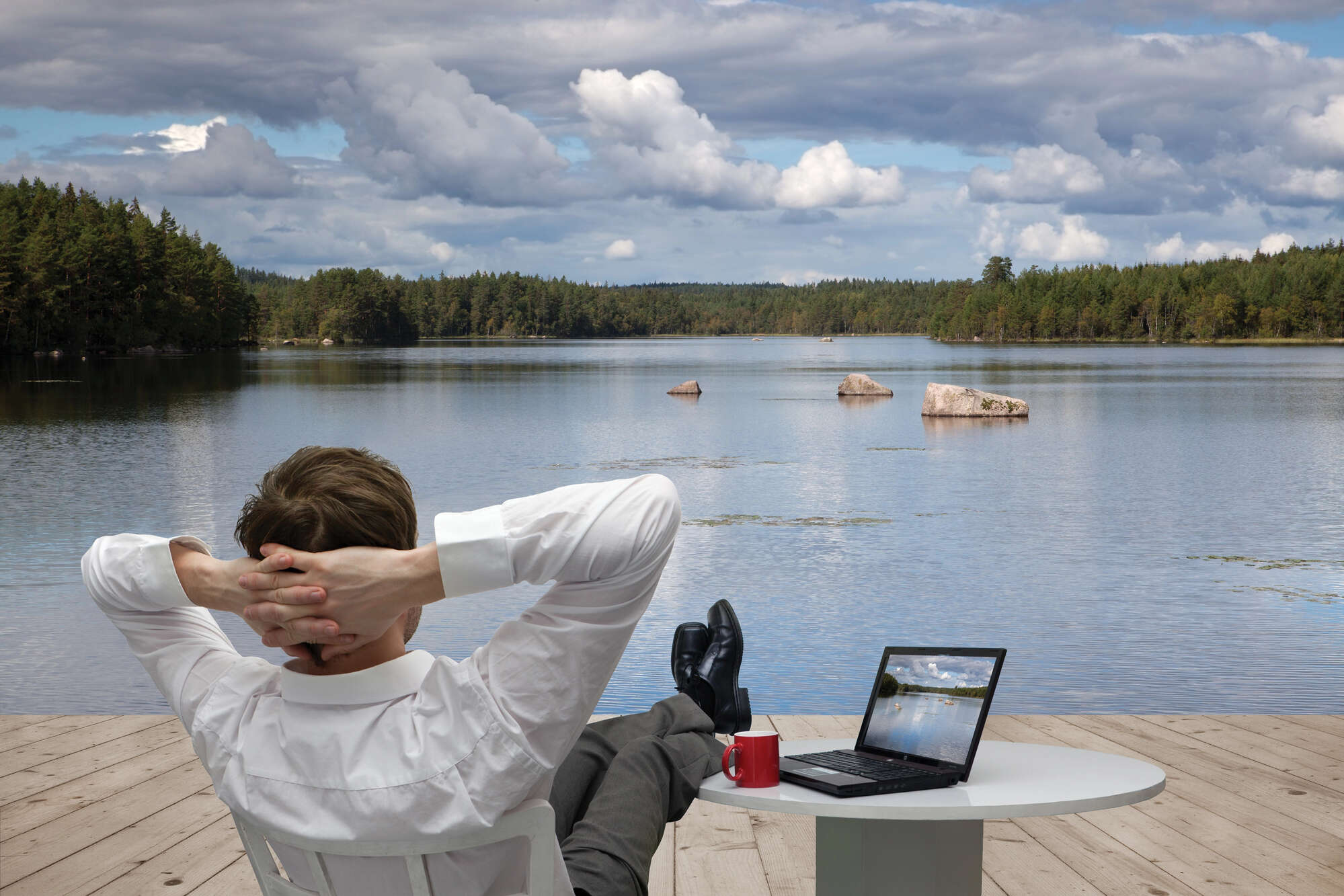Leonardo da Vinci, a polymath of the Renaissance, often engaged in multiple disciplines in a single day. Yet, he was a strong proponent of rest, frequently stepping away from his work to refresh his mind. It’s a testament to the truth about human productivity and creativity: the importance of taking breaks, a concept too often overlooked in our hustle-driven culture.
In our relentless pursuit of success, the idea of pausing might seem counterintuitive. However, looking into the science and practice behind strategic breaks reveals its significance in improving performance, well-being, and overall life satisfaction.
This article seeks to identify when to step back and how these intermissions can be more than timeouts, but catalysts for innovation and efficiency. We’ll look not only at the ‘why’ but also the ‘how’ of integrating meaningful pauses into your daily grind, shifting the focus from relentless pursuit to balanced progress.
What is Taking Breaks?
Taking breaks refers to deliberately pausing work or other activities, aiming to rejuvenate mental and physical wellbeing. These pauses serve as vital intervals, allowing us to step away from the demands of tasks and responsibilities.
Breaks vary in length and form, tailored to individual needs. By recognizing and integrating breaks into our routine, we honor our need for balance, cultivating a healthier approach to work and life.
What is the Importance of Taking Breaks?
Taking breaks is a major aspect of maintaining high performance, creativity, and well-being. Taking breaks is important because it acknowledges the human need to rest and recharge, ensuring that our productivity does not come at the expense of our health.
Breaks make a significant difference in how we approach our work and personal lives. They provide us with opportunities to relax, pursue interests outside of our obligations, or simply do nothing at all. This downtime is crucial for mental and physical recovery, helping to prevent burnout and sustain energy levels throughout the day.
Moreover, the decision to take breaks is important because it allows us to gain a new perspective on the challenges we face. When we return to our tasks after a break, we often find that solutions to problems are clearer, and tasks that seemed daunting before are now manageable. This refreshed outlook can lead to improved problem-solving abilities and creativity.
In fact, the benefits of taking breaks extend far beyond mere moments of pause. They are fundamental in rejuvenating both mind and body, allowing for sustained productivity and a healthier work-life balance.
Here’s how integrating breaks into your routine can transform your workday and overall life quality.
Boosts Creativity by Stepping Away to Refresh Your Mind
Creativity flourishes not in the midst of relentless work, but in the spaces between. When you take a break from work, especially a kind of break that diverts your attention and allows your mind to wander, you create room for your subconscious to process and connect ideas in novel ways. Research shows that taking breaks can actually help in the generation of creative ideas. A simple walk or a change of scenery during your lunch break can provide the much-needed mental reset to return to work with fresh insights and approaches.
Sharpens Focus by Breaking the Monotony of Continuous Work
Continuous work without breaks leads to a decline in performance and productivity, as the ability to focus diminishes over time. Taking short breaks throughout the day helps counteract this effect. It’s counterintuitive, but breaks can make you work better by allowing your brain to rest and recharge, much like a muscle recovering after exercise. Frequent breaks, even micro-breaks lasting a few minutes, have been found to significantly improve concentration and the quality of work produced.
Reduces Stress Through Moments of Rest and Relaxation
The importance of taking breaks extends to stress management. Working for hours on end without taking time to rest elevates stress levels and can lead to chronic stress and burnout. Breaks serve as an essential tool to help reduce anxiety and replenish mental resources. Activities such as power naps, meditation, or simply stepping away from your workstation to breathe and unplug can help you relax and lower the physical and mental toll of work-related stress.
Enhances Productivity by Pacing Your Energy Expenditure
It might seem that working longer hours leads to more accomplishments, but this is a misconception. Taking regular breaks can increase productivity by helping you manage your energy levels more efficiently. The Pomodoro Technique, for instance, advocates for work intervals broken up by short breaks, showing that taking breaks can help sustain concentration and energy over longer periods. This method prevents fatigue and helps maintain a steady pace of work, ensuring tasks are completed with greater accuracy and less time wasted.
Improves Problem-Solving with New Perspectives from Time Off
Stepping away from a challenging task can sometimes be the best way to tackle it. Breaks allow your mind to reassess the situation from a distance, often leading to a gain in new perspectives. This downtime is vital for problem-solving, as it gives your brain the opportunity to subconsciously process complex information and come up with solutions that might not be immediately apparent when deeply engrossed in work.
Strengthens Health by Mitigating Sedentary Lifestyle Risks
The health benefits of breaks, particularly those that involve physical activity, cannot be overstated. Sitting for prolonged periods is associated with a range of health risks, from cardiovascular disease to decreased mental health. By taking breaks to stand, stretch, or engage in a brief physical activity, you not only improve your physical health but also boost your mental alertness and performance. Making time to take a break in the morning and afternoon for some light exercise can make a significant difference in your overall well-being.
Deepens Engagement by Returning to Tasks with Renewed Interest
When work becomes monotonous, engagement levels drop. Taking breaks during the workday can break this cycle by providing a mental reset that allows you to return to your tasks with renewed interest and energy. This refreshed perspective can make you more invested in your work, helping create a deeper sense of satisfaction and accomplishment. Breaks, therefore, are not just pauses from work; they are opportunities to rekindle your enthusiasm and commitment to your tasks.
Elevates Mood by Interspersing Tasks with Joyful Pauses
Incorporating enjoyable pauses into your workday can significantly uplift your spirits. When work breaks include activities that bring joy or relaxation, such as listening to music, enjoying a snack, or simply stepping outside for fresh air, they can have a profound effect on your mood. These types of breaks help to replenish your mental energy and keep stress at bay, making it easier to maintain a positive outlook throughout the day.
When you give your mind a chance to unwind and enjoy small pleasures, returning to the task at hand feels less intimidating, and you’re more likely to approach your work with a constructive attitude. Take note that a great break isn’t simply about stopping work; it’s engaging in something that revitalizes your body and mind.
Nurtures Patience by Allowing Time for Mental Recovery
Patience in the workplace is often tested during long, uninterrupted periods of work. Breaks serve as key intervals that allow us to step back, breathe, and regain composure, fostering a sense of patience. By scheduling regular breaks, you remind yourself to take a moment to re-focus and reassess your approach to tasks.
This practice can help reduce frustration and prevent the feeling of being overwhelmed, making it easier to deal with complex situations with a calm and collected mindset. Learning how to take effective breaks is essential for maintaining patience, especially during challenging projects or when facing tight deadlines.
Encourages Learning by Reflecting on Completed Work During Downtime
Breaks can also serve as valuable opportunities for learning and reflection. After completing a task, taking a short break allows you to think about what you’ve accomplished and consider ways to improve or apply those insights to future projects. This kind of reflective break can improve your understanding of your work and promote continuous learning.
By taking time to assess your performance and the outcomes of your efforts, you can identify areas for growth and development, ultimately improving your skills and knowledge base.
Fosters Well-Being by Balancing Work with Leisure
The equilibrium between work and leisure is essential for long-term well-being. Breaks play a big part in establishing this balance by providing designated times to engage in non-work-related activities. Whether it’s a hobby, a quick workout, or simply time spent in quiet contemplation, breaks allow you to enjoy aspects of life outside of work, contributing to a more rounded and fulfilling existence.
These pauses are important reminders that while work is a significant part of life, it should not consume all our time and energy. By prioritizing breaks, we ensure that our work enriches rather than depletes our lives.
Sustains Motivation by Rewarding Effort with Breaks
Motivation can ebb and flow, especially during lengthy or complex tasks. Breaks act as milestones that offer a sense of accomplishment and reward for your efforts. Setting a timer to remind you to take breaks every hour, for instance, can help you stay focused and motivated, as you have a scheduled pause to look forward to.
This structure encourages a rhythm of work that aligns with your natural concentration cycles, making tasks feel more manageable and less monotonous.
Cultivates Resilience by Managing Work Intensity
Resilience in the face of demanding workloads is built through strategic rest as much as through perseverance. Breaks are important in managing the intensity of our work by providing necessary intervals to recharge and gather strength. This practice helps us to maintain high levels of performance without succumbing to burnout.
By acknowledging the signs of fatigue and allowing yourself time to stretch and rejuvenate every hour, you are actively building resilience, enabling you to tackle challenges with sustained energy and focus.
Promotes Social Bonds by Sharing Break Times with Others
Breaks offer a unique opportunity to strengthen social connections in the workplace. Taking breaks with colleagues can foster camaraderie and improve team dynamics. These shared moments away from work-related tasks allow for informal interactions and the strengthening of bonds, which can translate into better collaboration and communication during work hours.
Social breaks can also provide a different perspective on work challenges, as casual conversations often lead to creative solutions and new ideas.
Signs you’re not taking enough breaks
Recognizing the signs that you’re not taking enough breaks is key to maintaining productivity and well-being in a demanding work environment. Ignoring these signals can lead to burnout and decreased job satisfaction. Here, we look into common indicators that suggest you need to incorporate more pauses into your routine.
Your Focus Dwindles Rapidly
When concentration becomes fleeting and your mind starts to wander frequently, it’s a clear sign you’re overdue for a break. Continuous work without adequate pauses leads to a significant drop in attention span, making it harder to complete tasks efficiently.
- Difficulty staying on task
- Frequent lapses in concentration
- Needing longer periods to complete routine tasks
Physical Discomfort Becomes Noticeable
Ignoring the need for breaks often manifests in physical symptoms. Discomfort, particularly in the back, neck, and wrists, can indicate prolonged periods of static posture or repetitive motion, highlighting the necessity for regular movement.
- Muscle stiffness or soreness
- Repetitive strain symptoms, such as wrist pain
- Lower back discomfort from extended sitting
Productivity Noticeably Declines
A clear decrease in output, despite long hours of work, often signals insufficient breaks. When tasks that once took a shorter time now drag on, it might be time to reassess your break schedule.
- Tasks taking longer than usual to complete
- Decreased quality of work
- Increased errors or oversights
Irritability with Colleagues Increases
Feeling easily annoyed or short-tempered with coworkers can be a symptom of break deficiency. This irritability often stems from the stress and fatigue of continuous work without sufficient downtime.
- Shorter patience with team members
- Overreaction to minor issues
- Feeling overwhelmed by collaborative tasks
Creativity Feels Stifled
A lack of new ideas or solutions can indicate mental fatigue from inadequate breaks. Creativity thrives on a refreshed mind, and without breaks, innovative thinking can come to a standstill.
- Struggling to generate new ideas
- Difficulty thinking outside the box
- Feeling stuck or in a rut with projects
Eyes Frequently Feel Strained
Extended screen time without breaks can lead to digital eye strain, characterized by dryness, irritation, and difficulty focusing visually. This is a tangible sign that your eyes need a rest from the screen.
- Dry or itchy eyes
- Blurred vision or difficulty focusing
- Increased sensitivity to light
Headaches Become More Common
The onset of headaches, especially in the latter part of the workday, can be attributed to continuous cognitive effort without adequate rest. This can be exacerbated by eye strain and dehydration.
- Tension headaches, often in the forehead or temples
- Headaches that worsen as the day progresses
- Relief from headaches after stepping away from work
Sleep Quality Deteriorates
Poor sleep, including difficulty falling or staying asleep, can be a consequence of high stress and insufficient breaks. The mind’s inability to ‘switch off’ from work mode can significantly impact restorative sleep.
- Trouble falling asleep due to racing thoughts
- Interrupted sleep or waking up frequently
- Feeling tired despite a full night’s sleep
You Seldom Feel Refreshed
A constant sense of fatigue, even after what should be sufficient rest, indicates your breaks aren’t effective or frequent enough. Feeling perpetually tired is a sign your body and mind aren’t recovering adequately.
- Needing caffeine or other stimulants to stay alert
- Lack of energy despite adequate sleep
- Persistent feeling of exhaustion
Stress Levels Consistently Rise
An unmistakable sign of insufficient breaks is a steady increase in stress levels. Without time to decompress, stress accumulates, affecting not only work performance but also overall health and well-being.
- Feeling overwhelmed or unable to cope with work demands
- Physical symptoms of stress, such as increased heart rate or breathing
- Increased reliance on coping mechanisms, such as snacking or smoking
Addressing these signs early by incorporating more breaks into your day can prevent the negative spiral of burnout and promote a healthier, more balanced approach to work.
When should I take a break?
Deciding when to take a break is crucial for maintaining productivity and creativity in any work environment. Recognizing the right moments to step away can help prevent burnout and enhance overall performance. Here are key indicators that it’s time to take a pause from your tasks:
Encounter a Mental Block or Lack of Inspiration
Hitting a mental block is a clear sign your brain needs a rest. When ideas cease to flow or problems seem insurmountable, stepping away can provide the mental clarity needed to overcome these obstacles.
- Staring at your work without making progress
- Feeling stuck on a particular problem or task
- Lacking enthusiasm for tasks you usually enjoy
Reach a Pre-determined Work Interval, Such as After 90 Minutes
Setting a work interval, like the 90-minute rule based on the body’s natural rhythms, can optimize focus and energy. Taking a break after such a period helps maintain a high level of productivity throughout the day.
- Work in focused blocks of time (e.g., 90 minutes)
- Take a 10-15 minute break after each interval
- Use this time to completely step away from work-related thoughts
Complete a Significant Task or Milestone
Finishing a major task or reaching a milestone is the perfect opportunity to take a break. This pause acts as a reward and can help maintain motivation for the next phase of work.
- Recognize the completion of a significant piece of work
- Allow yourself a moment to appreciate the achievement
- Use the break to reset before tackling the next task
Need to Reassess Priorities or Strategy
If you find yourself uncertain about the direction of your work or need to rethink your strategy, it’s time for a break. Stepping back can provide a fresh perspective and help you prioritize effectively.
- Feeling overwhelmed by tasks without a clear priority
- Uncertain about the effectiveness of your current approach
- Needing clarity on the broader goals and objectives
Experience Diminishing Returns on Effort
When more effort doesn’t translate to better results, it indicates fatigue or overwork. A break can help rejuvenate your energy and productivity, making subsequent efforts more fruitful.
- Noticing a decrease in output despite increased effort
- Work quality begins to suffer
- Feeling more tired and less efficient
Require New Perspectives or Ideas
Seeking innovation or a different approach to a problem is a valid reason to take a break. Distance from work can stimulate creative thinking and lead to breakthrough ideas.
- Struggling to find creative solutions
- Needing inspiration for a project
- Looking for a fresh angle on a recurring challenge
Recognizing these signs and giving yourself permission to take a break can greatly enhance your efficiency and well-being.
How do you take breaks effectively?
Effective breaks can greatly improve both your productivity and overall well-being, especially in a high-pace work environment. The key is to take those breaks in a way that truly rejuvenates your body and mind, allowing you to return to work with a refreshed perspective and renewed energy. Here’s how you can make the most out of your breaks:
Step Away from Screens for a Full Disconnect
Breaks at work often mean switching from one screen to another. However, for a genuine mental reset, it’s important to fully disconnect from all digital devices. This means stepping away from your computer, phone, and other screens to give your eyes and mind a rest. This practice has been shown to reduce digital eye strain and mental fatigue, helping you to focus better when you return to your tasks.
- Leave your workspace and move to a different area
- Avoid checking your phone or other digital devices
- Use this time to engage in a non-screen related activity
Choose an Activity that Contrasts with Your Work
Engaging in an activity that is markedly different from your work tasks can stimulate new parts of your brain, fostering new creative insights. If your work is heavily analytical, try something creative or physical. Conversely, if your work is creative, engage in a structured or analytical task. This contrast helps to reset your mental state and can improve your performance when you return to work.
- If you work at a desk, choose a physical activity
- For mentally intensive work, try a relaxing activity
- Engage in a hobby or interest unrelated to your work
Set a Timer to Cap Break Length
To ensure breaks remain effective and don’t encroach on work time, setting a timer is key. The Pomodoro Technique recommends a 5-minute break every 25 minutes, with a longer break after four cycles. This structured approach helps maintain focus and productivity throughout the day.
- Use a timer or app to schedule your breaks
- After 25 minutes of work, take a 5-minute break
- Take a longer 15-30 minute break every two hours
Incorporate Light Physical Movement
Light physical activity during breaks has been found to boost energy levels, improve mood, and enhance cognitive function. A short walk, stretching, or simple exercises can invigorate your body and mind, making it easier to tackle the next work session.
- Take a brisk walk around the office or block
- Practice stretching exercises or gentle yoga
- Stand and move around instead of sitting
Engage in Brief, Mindful Meditation
Mindful meditation can help to reduce stress and anxiety, allowing you to return to your work with a clearer, more focused mindset. Even just a few minutes of meditation can have a significant impact on your mental well-being.
- Find a quiet space to sit comfortably
- Focus on your breath, inhaling and exhaling slowly
- Try to clear your mind of work-related thoughts
Refresh with a Healthy Snack or Water
Hydration and nutrition are key components of an effective break. A healthy snack or a glass of water can replenish your energy levels and improve concentration. Opt for snacks that provide sustained energy, like fruits, nuts, or whole grains.
- Keep a water bottle at your desk to stay hydrated
- Choose snacks that are high in protein and fiber
- Avoid sugary snacks that can lead to energy crashes
Step Outside for Fresh Air and Natural Light
Exposure to natural light and fresh air can greatly improve your mood and energy levels. A brief walk outside or simply standing in a natural setting can help to reset your mental state and provide a new perspective on your work.
- Spend a few minutes outside, if possible
- If you can’t go outside, try to find a spot near a window
- Take deep breaths to maximize the intake of fresh air
Connect Briefly with a Colleague or Friend
Social interaction, even if brief, can be a powerful way to break the monotony of work. A quick chat with a colleague or a friend can lift your spirits and provide a much-needed mental break from work-related tasks.
- Have a light-hearted, non-work-related conversation
- Share a laugh or a positive story
- Keep the interaction brief to ensure it’s refreshing rather than distracting
Completing a small, non-work-related task can provide a sense of achievement and satisfaction. This could be anything from watering plants to organizing your workspace. The key is to choose something simple that can be completed in a short time frame.
- Pick a task that can be finished in under 5 minutes
- Ensure the task is unrelated to your current work projects
- Enjoy the immediate sense of accomplishment
Sketch a Daydream in Your Notebook
Allowing your mind to wander freely and capturing those thoughts through sketching can be a refreshing break from structured work. This exercise can unlock creativity and provide a mental reset, helping you to approach your work with fresh ideas.
- Keep a notebook and pen handy for doodling
- Let your sketches be free and unstructured
- Use this time to visually express any thoughts or ideas, no matter how abstract
Breathe Deeply, Counting Each Inhale and Exhale
Deep breathing exercises are a quick and efficient way to reduce stress and recenter your focus. By simply taking a few moments to concentrate on your breathing, you can significantly lower your heart rate and calm your mind, preparing you to return to your tasks with improved concentration and reduced anxiety.
- Sit or stand in a comfortable position
- Inhale slowly and deeply through your nose, counting to five
- Hold your breath for a moment
- Exhale slowly through your mouth, counting to five
- Repeat this cycle for two to five minutes
Sip Water Slowly, Savoring Each Drop
Hydration is key to maintaining optimal brain function and energy levels. Taking a break to slowly sip water not only helps to hydrate but also provides a moment of mindfulness, allowing you to pause and refresh both your body and mind.
- Keep a glass or bottle of water at your desk
- Take small, slow sips, focusing on the sensation and taste
- Use this time as a pause from screen time and mental tasks
Straighten Your Posture, Then Relax Your Shoulders
Maintaining good posture is important for avoiding physical strain and enhancing mental alertness. A break focused on correcting your posture and relaxing tense muscles can help prevent discomfort and boost your energy levels.
- Stand up or sit up straight, aligning your head with your spine
- Roll your shoulders back gently and then let them relax
- Stretch your neck and back if needed to release tension
- Repeat the shoulder relaxation a few times
List Three Things You’re Grateful for Today
Practicing gratitude can significantly improve your mood and perspective. Taking a break to reflect on and write down things you’re grateful for can help shift your focus from work-related stress to positive aspects of your life, enhancing your overall sense of well-being.
- Keep a small notebook or journal nearby
- Each break, write down three new things you’re grateful for
- Focus on both big and small sources of gratitude
Focus on a Single Object and Study Its Details
Choosing an object to focus on and examining its details can be a meditative exercise that helps clear your mind. This practice encourages mindfulness and can reduce feelings of overwhelm by anchoring your attention to the present moment.
- Select an object within your vicinity
- Observe its color, texture, shape, and any other details
- Allow yourself to become fully absorbed in this examination for a few minutes
Stretch, Reaching High and Bending Low
Regular stretching can alleviate muscle tension caused by prolonged sitting or standing. Incorporating stretching into your breaks not only helps to keep your body limber but also increases blood flow, enhancing mental clarity and focus.
- Perform a series of stretches that target your arms, legs, neck, and back
- Focus on gentle, fluid movements
- Breathe deeply and evenly as you stretch
Recite a Poem or a Quote That Inspires You
Reciting something inspirational can offer a mental boost and renew your motivation. Whether it’s a favorite poem, quote, or even a piece of prose, this practice can provide a source of comfort and encouragement during a hectic day.
- Choose a piece that resonates with you personally
- Keep a copy of it at your desk for easy reference
- Recite it silently or aloud, focusing on the words and their meaning
Doodle Aimlessly, Letting Your Mind Wander
Doodling can be a surprisingly effective way to relax and foster creativity. It allows your mind to wander away from work-related thoughts and can lead to unexpected insights and ideas.
- Keep a notepad and pen handy specifically for doodling
- Let your hand move freely without focusing on creating anything specific
- Enjoy the process without worrying about the outcome
Feel the Texture of an Object Near You
Engaging your sense of touch can provide a grounding experience, bringing you back to the present moment and away from mental stress. This simple sensory exercise can help to calm your mind and sharpen your focus.
- Choose an object with an interesting texture, such as a stress ball, a fabric swatch, or even a piece of nature like a small stone
- Focus on the sensations as you touch and explore the object
- Reflect on the feeling of the object in your hand and let it anchor you to the moment
Return with a Specific Goal in Mind
Ending your break with a clear objective for what you’ll tackle next can help transition your mindset from rest back to work. This practice helps to maintain focus and productivity by providing a direct purpose as you resume your tasks.
- Before concluding your break, decide on the first task you’ll address
- Make it specific and achievable to avoid feeling overwhelmed
- Use this goal to guide your transition back into work mode
Conclusion
Acknowledging the importance of taking breaks is the first step toward a more balanced and fulfilling approach to work and life. By adopting and honing the practice of pausing, we allow ourselves the space to breathe, reflect, and return to our tasks with renewed vigor and perspective.
Are we, in our continuous pursuit of productivity, overlooking the very technique that could improve it? It’s time to challenge our preconceptions about downtime and recognize that in the rhythm of exertion and relaxation lies the key to our best work.
FAQs
Q: How should I take breaks at work?
A: It’s important to schedule short, regular breaks throughout the day. This can include taking short walks, stretching, or simply stepping away from your desk to give your mind and body a quick rest.
Q: Is taking a longer break better for my wellbeing?
A: Yes, longer breaks such as a lunch break or a brief afternoon rest can help recharge your energy levels, reduce potential health risks, and improve cognitive function.
Q: What kind of break should I take to improve my overall wellbeing?
A: It’s beneficial to incorporate both physical and mental breaks into your routine. This can include engaging in exercise, meditation, or simply disconnecting from work-related tasks.
Q: How can I learn how to take effective breaks?
A: You can learn effective break strategies through resources such as mindfulness and stress management workshops, as well as online tools that promote healthy break habits.









